Developing the personalized future of cancer treatment
A CAMI scientist is leading efforts to create a new kind of cancer immunotherapy – neoantigen-specific cancer vaccines – to target patient-specific tumors and destroy cancer cells.
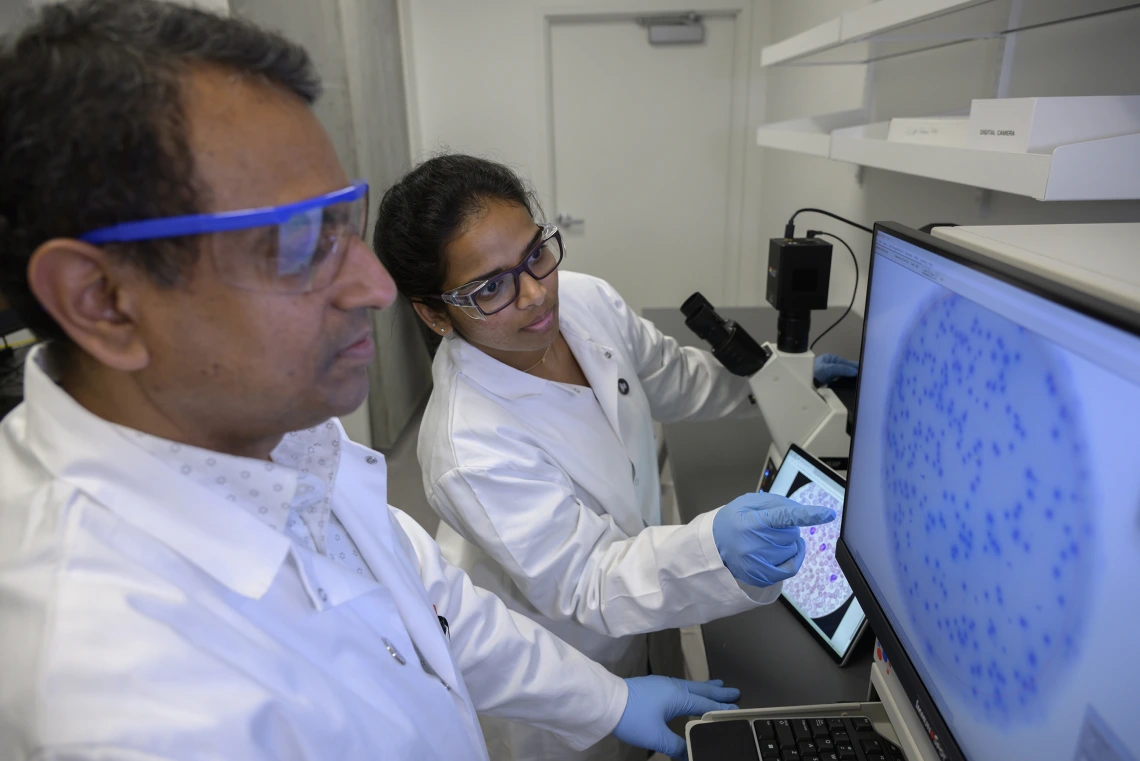
(From left) Tanvir Ahmed, PhD, pictured with research professional Ankitha Kunta, leads the personalized cancer vaccine program at the Center for Advanced Molecular and Immunological Therapies.
Photo by Kris Hanning, U of A Health Sciences Office of Communications
Tanvir Ahmed, PhD, has dedicated his career to advancing vaccine development and immunotherapy. Now, as a principal scientist at the University of Arizona Health Sciences Center for Advanced Molecular and Immunological Therapies, he’s pursuing a new way to create vaccines designed to train the body’s immune system to destroy tumors.
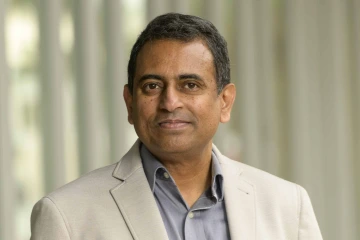
Ahmed, one of three principal scientists at CAMI, has 25 years of biopharmaceutical experience in vaccine development for cancer and infectious diseases.
Photo by Kris Hanning, U of A Health Sciences Office of Communications
“My main focus is to develop customized cancer vaccines using mRNA and our body’s own immune system,” Ahmed said. “We design these vaccines to train the immune system to specifically target cancer cells, while leaving healthy cells unharmed.”
The idea is ambitious, and it’s beginning to take shape at CAMI, a new biomedical research center in Phoenix. There, researchers are leveraging cutting-edge immunology and bioinformatics to develop vaccines as unique as the patients they’re meant to treat.
“I think that almost all of us have been affected by cancer, either ourselves or through our relatives. It is still one of the leading causes of death in the U.S.,” said Deepta Bhattacharya, PhD, the inaugural executive director of CAMI and a professor in the U of A College of Medicine – Tucson’s Department of Immunobiology. “Some of the most exciting developments are using the immune system to attack the mutations that cause the cancer. You’re not using the same old slash-and-burn methods of surgery and radiation and chemotherapy, but rather a much more targeted way of going after the tumor.”
Pointing precision medicine at cancer
Personalized cancer vaccines begin with a simple premise: every tumor is genetically unique and therefore requires a tailored treatment. In CAMI’s personalized cancer vaccine program, Ahmed and his team analyze samples of a patient’s tumor and healthy tissue, then use genetic sequencing to identify mutations present only in the cancer cells.
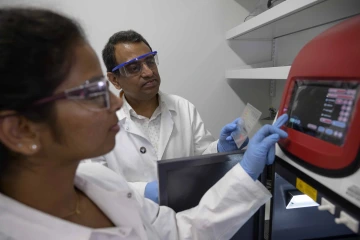
(From left to right) Ankitha Kunta and Ahmed review cancer-specific protein bands with a gel documentation system in their laboratory in Phoenix.
Photo by Kris Hanning, U of A Health Sciences Office of Communications
The mutations can change the amino acid sequence of proteins, resulting in new proteins known as neoantigens. Ahmed’s group is using messenger RNA, or mRNA, to train the immune system to recognize and target these neoantigens.
mRNA carries genetic instructions from a cell’s DNA to its protein-making machinery. Once Ahmed and his team identify the most promising neoantigens, they create mRNA molecules that will instruct the cell to make these neoantigens. When injected, the mRNA vaccine can create or strengthen an immune response to the neoantigens and the cancer cells where they reside.
“Traditional cancer treatments affect both cancerous and healthy cells, which can cause severe side effects,” Ahmed said. “This approach is more precise. We’re helping the immune system see what it needs to see and ignore everything else.”
Ahmed estimates that CAMI’s personalized cancer vaccine program could reach Phase 1 clinical trials within the next two to three years. His ongoing work, in collaboration with Ryan Sprissler, PhD, associate director of CAMI, is focused on proof-of-concept studies in preclinical models, evaluating both preventive and therapeutic strategies.
Currently, Ahmed’s early studies are focused on melanoma, but he sees opportunities to expand into other hard-to-treat cancers, including breast, prostate and aggressive brain cancers.
Bridging research and industry
Unlike traditional vaccines produced at scale, personalized cancer vaccines must be custom-built for each patient, often within tight timelines. Ahmed noted that developing personalized vaccines can present manufacturing challenges, require stringent testing and necessitate regulatory processes that can adapt to individualized treatments.
Ahmed remains optimistic despite the challenges, in part from his vast experience in the industry. He brings deep expertise to CAMI, having led vaccine programs for cancers and infectious diseases in a biopharmaceutical career spanning 25 years.
“For my entire career, I’ve been focused on the goal of developing innovative vaccines and immunotherapies,” he said. “CAMI offers the perfect intersection of academic research and real-world impact.”
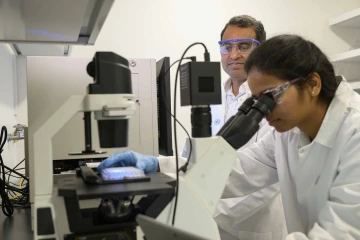
Kunta examines the immune system's response to tumor cells, which is part of the process she and Ahmed use to identify neoantigens for personalized cancer vaccines.
Photo by Kris Hanning, U of A Health Sciences Office of Communications
He previously served as the director of drug development at VBI Vaccines Inc., where he led teams in research, manufacturing and regulatory affairs to advance next-generation vaccine platforms. His background includes a medical degree from the University of Dhaka in Bangladesh, research experience at the International Centre for Diarrhoeal Disease Research, Bangladesh, where he conducted Phase I/II clinical trials on enteric vaccines, a doctorate in enteric vaccine development from the University of Gothenburg in Sweden, and postdoctoral training in cellular and molecular immunology at Tufts University.
“We are so thrilled to have Tanvir,” Bhattacharya said. “He comes to us with a wealth of experience in drug and late-stage vaccine development at a company. Having someone with that experience and who really knows how to aim those vaccines in the immune system against the very mutations that cause cancer is just hugely exciting for us.”
Now based in Phoenix, Ahmed is actively shaping CAMI’s personalized cancer vaccine program by building a dynamic team. He is forging strategic partnerships with biotech firms to secure advanced mRNA synthesis and nanoparticle delivery technologies, while collaborating with academic institutions to refine neoantigen-identification algorithms. These efforts will accelerate preclinical studies, with the goal of advancing melanoma-focused vaccines toward clinical trials within the next few years.
Ahmed sees CAMI’s long-term infrastructure plans as essential to creating a “one-stop shop” for advancing new therapies.
“This is a big idea, but we’re not that far off,” he said. “If we can move quickly from sequencing to synthesis and keep refining the process, we’ll be in a position to help patients sooner than people might think.
“If we succeed,” he added, “we can change the way we treat cancer.”
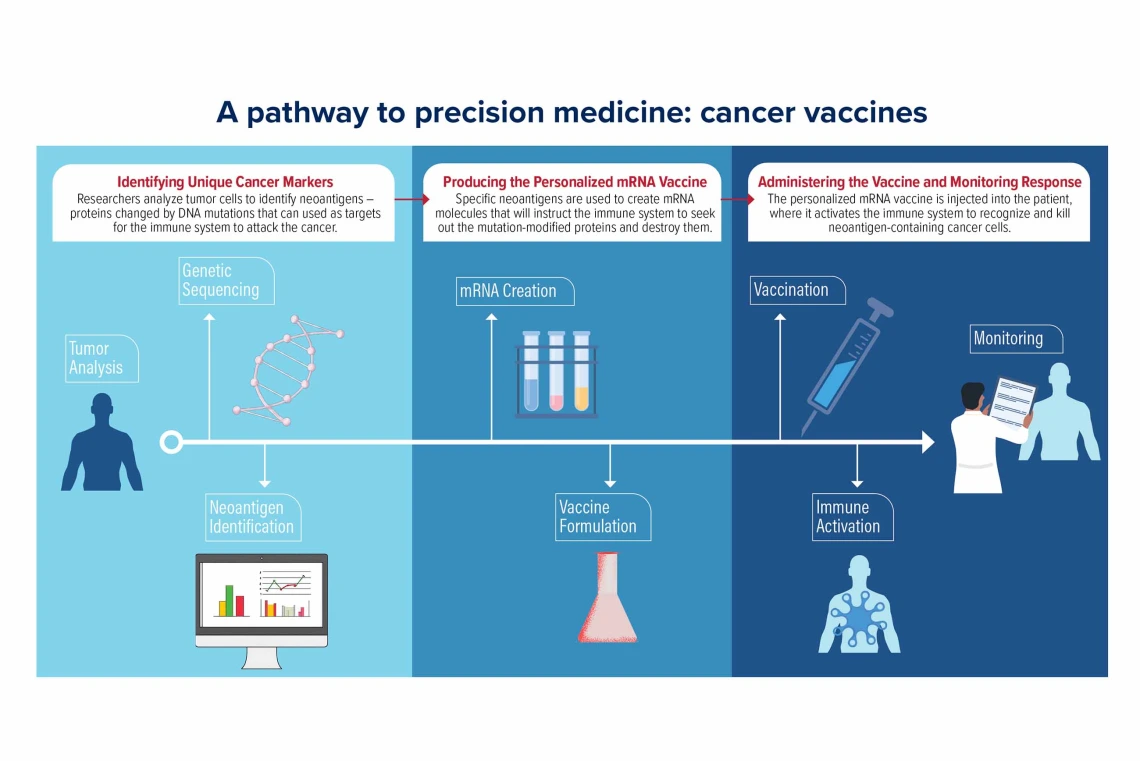
Illustration by Xinyu Zhang, U of A Health Sciences Office of Communications
Experts
Tanvir Ahmed, PhD
Principal Scientist, Center for Advanced Molecular and Immunological Therapies, U of A Health Sciences
Deepta Bhattacharya, PhD
Inaugural Executive Director, Center for Advanced Molecular and Immunological Therapies, U of A Health Sciences
Professor, Department of Immunobiology, U of A College of Medicine – Tucson
Professor, Department of Surgery, U of A College of Medicine – Tucson
Member, U of A Cancer Center
Member, BIO5 Institute
Ryan Sprissler, PhD
Associate Director, Center for Advanced Molecular and Immunological Therapies, U of A Health Sciences
Associate Director, Operations, U of A Office of Research, Innovation and Impact
Associate Research Professor, BIO5 Institute
Related Stories
Contact
Blair Willis
U of A Health Sciences Office of Communications
520-419-2979, bmw23@arizona.edu

